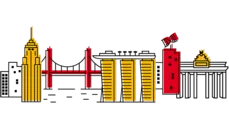
Despite the Covid-19 pandemic, entrepreneurs in the Bay Area are still hard at work creating innovative products and seeking funding. Investors and venture capitalists are still on the lookout for promising new startups.

One key player at the center of this activity is German Accelerator. Supported by the German Federal Ministry for Economic Affairs and Energy, German Accelerator helps German companies move into the international marketplace. They do this by offering a variety of specifically-tailored programs in the world’s innovation epicenters, including San Francisco, Silicon Valley, New York, Boston, and Singapore.
Since 2012, they have helped over 250 startups, which have raised over three billion dollars. What is unique about German Accelerator is the dense network of mentors. In total, there are over 300. These mentors are seasoned business professionals with deep roots in the startup communities they serve. The result is that companies going through the Accelerator programs have a 91 percent survival rate. Once a company has completed the Accelerator program, the founders are invited to make a pitch before investors and others at a German Startup Night.
German Accelerator is totally online for the duration
So what does a German Startup Night look like during the coronavirus pandemic? We recently had the opportunity to take part in the first German Startup Night Virtual Edition – New York & Silicon Valley. On June 25, 2020, seven participating companies graduated from the Market Access program and made their pitch to a panel of three potential investors and an enthusiastic crowd of online viewers. It was the Accelerator’s first-ever virtual Startup Night. The viewers were invited to vote on the best pitch.
Pitch time – who will make it?
A representative from each participating company gave a three-minute pitch, followed by questions from a panel of three potential investors. The pitches showed how much the founders of the competing startups had learned during their time in the program. All of the pitches were excellent but in the end, we had to vote on only one as the winner. The competitors were:
- Resado GmbH Resado produces endpoint cybersecurity solutions for the Internet of Things (IoT). Cyberattacks are a persistent threat and they cost the economy over six billion dollars every year. To combat this, Resado’s products include software deployed on a chip that accompanies an IoT device throughout its product lifecycle. This makes it secure now and into the future. The company also offers engineering and consulting services to provide customers with state-of-the-art IoT security solutions.
- PAFnow PAFnow uses the business analytics service Power BI to provide a process mining tool. The product allows customers to use the Power BI software they already have to perform process mining analysis. The result is a visualization of the customer’s business process data, combined with deep-dive metrics and recommendations to improve efficiency and harmonize processes across the company’s operations.
- SQIN As a company, SQIN is active in the beauty products industry. What they provide, however, is not a cleanser or a lotion, but an intelligent app. The app matches the user’s skin type to appropriate products. Instead of having to buy a lot of different products and learning what works by trial and error, the user can simply enter information about their unique skin type and the app intelligently matches commonly available beauty products at the best price. It is therefore a personalized beauty advisor with the power of machine learning based on data provided by over four million users. The app becomes more useful over time.
- MicroStream MicroStream’s software allows customers to solve a persistent problem: Java stores data in an object-graph model, while databases store data in other formats such as tables. The result is that every operation requires a transformation of the data, leading to slower runtimes and increased costs. MicroStream solves this problem with a technology that can store Java objects natively and avoid the transformation of otherwise incompatible data structures.
- Das Boep Das Boep is an all-natural skincare products company with a special focus on babies. Their products were developed by a doctor, who is also a mother, because there were no suitable products for her daughter’s sensitive skin. Now the company offers products for the whole family. They already have strong online sales, and are seeking to enter the US market with a retail partner.
- Smart City System Smart City System offers a smart parking management solution to municipalities and parking lot operators. A simple sensor at each parking space wirelessly transmits occupancy status to the user via an app. Parking lot operators can know the condition of their parking lots at all times, and drivers can find an available parking spot right from their smartphone or tablet.
- RankingCoach RankingCoach provides an online marketing solution focused on small and medium-sized businesses. The company offers solutions for online local marketing, Google Ads, search engine optimization (SEO), reputation management, social media monitoring and brand monitoring. The goal is to make small and medium-sized business more visible and drive more customers to their doors.
When all the pitches were over, the audience was invited to vote for the best pitch. It was a hard choice. In the end, SmartCity System was the lucky winner to walk away with the $1,000.00 prize. Thanks from TUM San Francisco to German Accelerator and all of the participating companies. The first German Accelerator Startup Night Virtual Edition was a great success and we look forward to the next one.